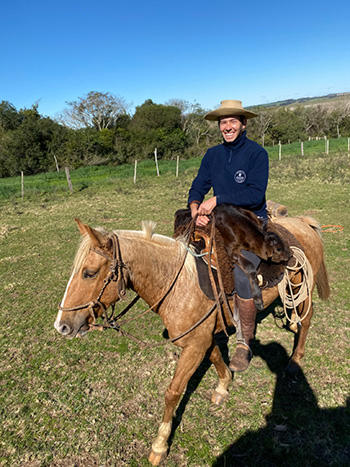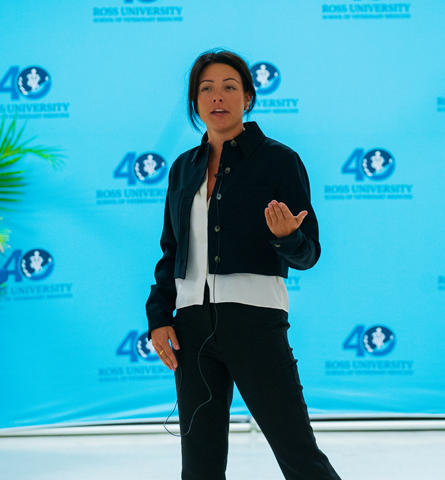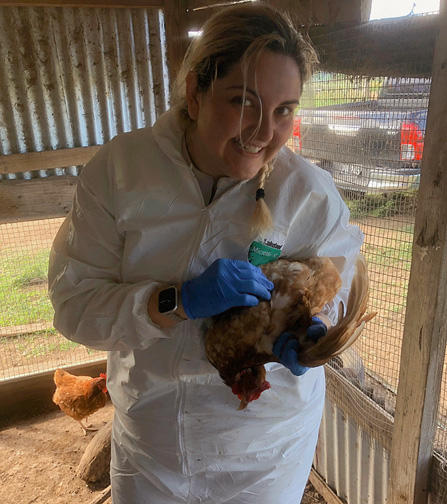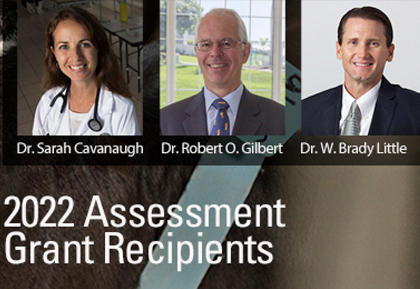In just his first two years as a postdoctoral fellow and assistant professor of theriogenology at Ross University School of Veterinary Medicine (Ross Vet), Lorenzo Segabinazzi, DVM, MS, PhD, has co-authored 22 manuscripts, collaborated on 21 research projects, and brought 30 students into his ongoing research as assistants and volunteers. For these achievements and more throughout his 10-year career as a veterinarian, Dr. Segabinazzi has been awarded the annual Research Excellence Award from Ross Vet’s Center for Integrative Mammalian Research.
Annually, each of Ross Vet’s four on-campus research centers awards one of their colleagues with the Research Excellence Award. The four awards represent outstanding contributions to veterinary research conducted at Ross Vet and throughout the awardees’ respective careers.
“I am so grateful for the recognition of my research,” said Dr. Segabinazzi. “I have always been committed to discover and solve problems in the field of theriogenology, so it’s really nice seeing that my work could help other researchers and practitioners.”
Dr. Segabinazzi first joined the Ross Vet community as a postdoctoral fellow in 2021 and joined the faculty upon completion of his fellowship. He immediately involved himself in ongoing research studying donkey reproduction under the supervision of Robert Gilbert, BVSc, MMEDVET, DACT, FRCVS, and Hilari French, DVM, PhD, DACT, DABVP, both professors of theriogenology, a specialty field concerned with animal reproduction.
INTEREST IN THERIOGENOLOGY
Dr. Segabinazzi’s interest in theriogenology dates back to his childhood in his native Brazil. “I grew up working on my family’s cattle and horse ranch,” he shared. “During my youth, I learned how to ride and train horses, which fostered my interest in pursuing my veterinary career. When I was in high school, I got certified for insemination in cows and worked with veterinarians in protocols of fixed time artificial insemination in cattle. After I started veterinary school, my interest in animal reproduction only grew.”
He attended Federal University of Pelotas’ DVM program and began working as a Stud Farm Veterinarian shortly after. His academic training continued at Sao Paulo State University’s Animal Reproductive Biotechnology program for his MS and PhD. During his master’s training, Dr. Segabinazzi worked with endometritis and embryo transfer in mares.
His primary study - Uterine clinical findings, fertility rate, leucocyte migration, and COX-2 protein levels in the endometrial tissue of susceptible mares treated with platelet-rich plasma before and after AI - was published in the Journal of Theriogenology, selected for Brazilian national research awards, and chosen as one of the top practical studies in reproduction at the 2017 American Association of Equine Practitioners (AAEP) Convention. Another study developed during his PhD - Application of Misoprostol as a Treatment of Unexplained Infertility in Mares – earned the same honors at the 2018 AAEP Convention.
Upon completion of his master’s degree, Dr. Segabinazzi relocated to the United States to work in a breeding center in Ada, Oklahoma, where he oversaw production of nearly 200 embryos annually during his three years there. The Sao Paulo State University PhD program in which he enrolled was completed in partnership with the University of Illinois Urbana-Champaign where he continued work with endometritis, embryo transfer, semen projects, and cell therapy in horses and donkeys. While at the University of Illinois, he involved himself in several practical student laboratories and ongoing projects, which enhanced his teaching experience and reinvigorated a longtime passion for the classroom.
“After I completed my academic training and spent enough time in the field, I had a feeling that staying at that level of practice would not fully satisfy my personal aspirations,” he shared. “I felt the urge to pursue my other passions for discovery, learning new things, and teaching.”
AT ROSS VET
During his first year as a member of the faculty at Ross Vet, Dr. Segabinazzi was an author or co-author of 10 manuscripts, which involved collaboration with five students (three MSc by Research and two DVM candidates). He presented 10 research projects across six scientific conferences and was a collaborator on 21 total projects. In addition, during this time Dr. Segabinazzi had two studies published in the The Horse journal, in which he described techniques to improve sperm quality of stallions and fertility rates in jennies after embryo transfer. On campus, he has been a strong advocate for involving students in ongoing research, bringing an additional 25 assistants and volunteers into his projects along with the five who had co-authored his manuscripts. A full list of Dr. Segabinazzi’s available projects and publications is available via ResearchGate.
“Ross Vet, my supervisors, and my colleagues provide me as many opportunities as possible to help me advance my research and career through continuous education programs, fundings for projects, and internal and external partnerships.”
With his first year already resulting in an esteemed colleague recognition in the Research Excellence Award, Dr. Segabinazzi has settled well into the latest stop along his career journey. “I will be always grateful for everyone I’ve met throughout my life that helped me to be a better veterinarian, researcher, teacher, and most importantly a better person.”
Learn more about how you can immerse yourself in ongoing research opportunities at Ross Vet here.







